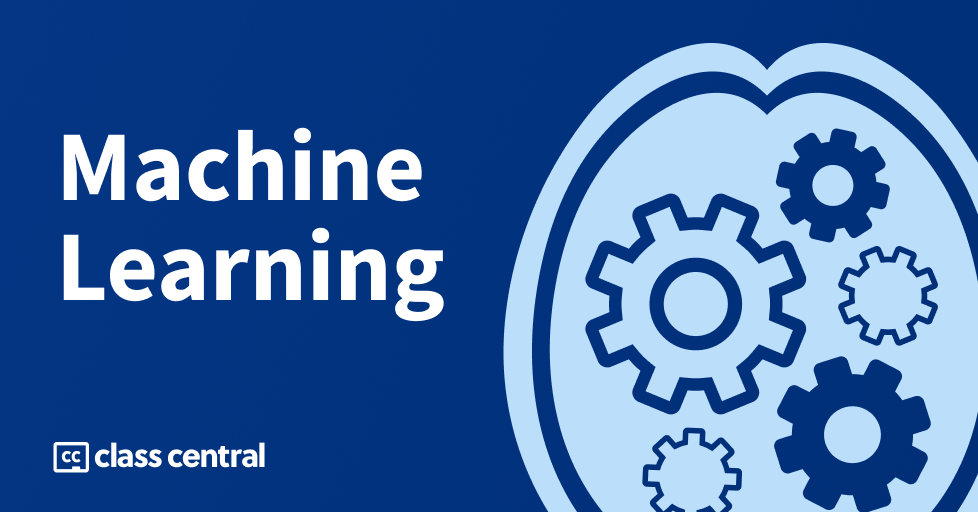In this article, I’ve compiled a list of the best machine learning courses available online. I built the ranking by following a well-defined methodology that you can find below.
But if you want to jump straight to the results, here are my picks:
- Machine Learning (Stanford University)
- Machine Learning Foundations: A Case Study Approach (University of Washington)
- Machine Learning for All (University of London)
- Machine Learning with Python (IBM)
- Machine Learning (Georgia Tech)
- Machine Learning Crash Course with TensorFlow APIs (Google)
- Machine Learning A-Z: Hands-On Python & R In Data Science (Udemy)
- Introduction to Machine Learning in Production (DeepLearning.AI)
- Python for Data Science and Machine Learning Bootcamp (Udemy)
- Machine Learning for Musicians and Artists (Goldsmith)
What is Machine Learning?
Machine learning is a subfield of artificial intelligence dedicated to the design of algorithms capable of learning from data. It has numerous applications, including business analytics, health informatics, financial forecasting, and self-driving cars.
In 2022, machine learning skills are widely in-demand. On Microsoft’s career page, 21% of the open developer positions currently mention “machine learning”. On Amazon’s career page, it’s 63%.
According to the Future of Jobs Report published by the World Economic Forum, machine learning is expected to be one of the world’s most in-demand skills through 2025.
Course Ranking Methodology
To create this ranking, I followed a three-step process:
First, I’m a developer at Class Central, the leading search engine for online courses.
So I went through our catalog of over 50K courses to put together a preliminary selection. I did so by taking into account factors like reviews, ratings, enrollments, bookmarks, and more.
So this was a rather objective step: I narrowed down the options by looking at well-defined metrics.
Second, I used my experience as an online learner to evaluate each preliminary pick.
Metrics such as course ratings rarely tell the whole story. I’ve completed many MOOCs, earned an online bachelor’s in computer science, and I’m enrolled in Georgia Tech’s online master’s in computer science (OMSCS). This has given me some perspective on what to look for in an online course, which I used to evaluate each of my preliminary picks.
So this was a rather subjective step: I combed through my picks to arrive at a near-final selection.
Third, I expanded this selection to include other valuable resources I’ve come across.
Since there are long-established courses in most topics, more recent courses on the same topic can go unnoticed. But sometimes, these are great. I made sure to include those when possible.
So this is a rather subjective step again: I rounded up my picks with excellent but less well-known courses.
The end result is a unique selection of courses that combines a decade of Class Central data and my own experience as an online learner to try to get the best of both worlds. So far, I’ve spent more than 15 hours building this list, and I’ll continue to update it.
Course Ranking Statistics
Here are some statistics regarding this course ranking:
- Combined, these courses have accrued over 6.6M enrollments.
- The most-represented course provider in the ranking is Coursera, with four courses.
- Combined, these courses have been bookmarked over 118,000 times on Class Central, while the machine learning subject itself has been bookmarked over 195,000 times.
- The most-popular course in the ranking has over 4M enrollments by itself.
- Eight courses are free or free-to-audit, while two are paid.
- Combined, these courses are received over 500 reviews on Class Central.
Without further ado, here are my picks for the best machine learning online courses.
1. Machine Learning (Stanford University)
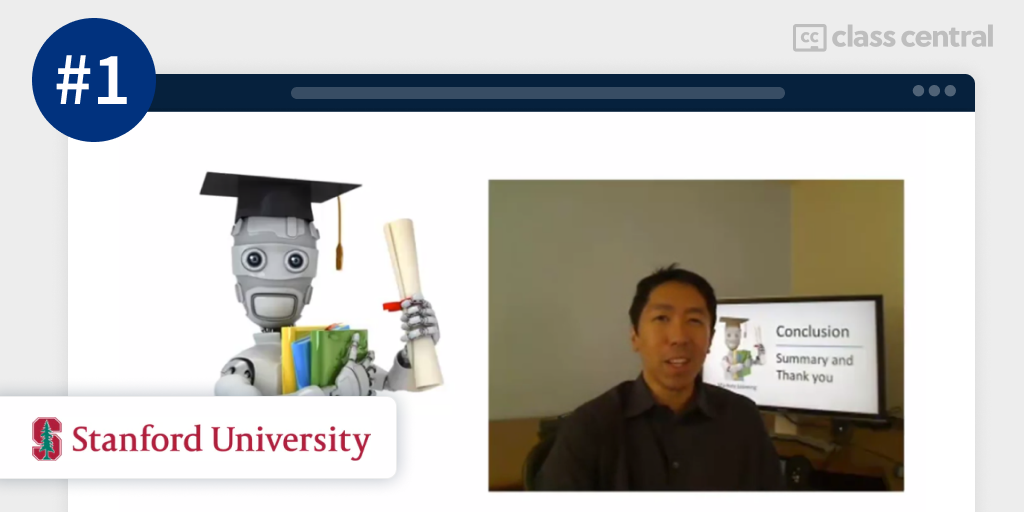 Prof. Andrew Ng, instructor of the course
Prof. Andrew Ng, instructor of the course
My first pick for best machine learning online course is the aptly named Machine Learning, offered by Stanford University on Coursera.
This is the seminal machine learning course, and a very special course indeed. Taught by Andrew Ng, it was one of the original courses that kicked-off the popularization of massive open online courses (MOOCs).
Bolstered by the course's success, Andrew Ng went on to cofound Coursera.
What You'll Learn
This course starts by laying down the mathematical foundations of machine learning. It begins with a review of linear algebra and univariate linear regression before moving on to multivariate and logistic regression.
It then jumps from topic to topic each week to cover a wide variety of machine learning techniques and models. These include deep learning, support-vector machines, and principal component analysis.
Finally, it touches on practical aspects such as how to design and leverage large-scale machine learning projects.
By the end of the course, you’ll have a broad understanding of machine learning, its concepts, and its methods. You’ll be able to implement fundamental machine learning algorithms such as back propagation and k-means clustering.
You’ll be equipped to tackle tasks such as multi-class classification and anomaly detection. And you’ll be able to use Octave and Matlab to complete practical projects involving optical character recognition using a wide variety of approaches.
One Thing to Note
This course uses Octave rather than, say, Python. The course will teach you the concepts but not the tools most commonly used nowadays in machine learning. Despite that, it remains in my view the machine learning course of choice, hence its top spot.
But if you’re looking for a course more relevant to the day-to-day of a machine learning practitioner, check the next pick.
How You’ll Learn
The course is broken down into 11 weeks. Each week involves about 6 hours of work. Concepts are taught through a combination of video lectures and readings.
In terms of assessments, each week includes at least one auto-graded quiz. Most include several. And most weeks include a multiple-hours long programming project. There are 8 in total.
| Institution | Stanford University |
| Provider | Coursera |
| Instructor | Andrew Ng |
| Level | Mixed |
| Workload | 61 hours total |
| Enrollments | 4.5M |
| Rating | 4.9 / 5.0 (166K) |
| Certificate | Paid |
Fun Facts
- The course launched in October 2011 with over 100K learners, just two months after being announced. It was unprecedented for a course to have this many learners.
- With 4.5M learners, it has grown to become one of the most popular online courses ever, if not the most popular ever.
- Besides being a professor of computer science at Stanford University, Andrew Ng was the former Chief Scientist at Baidu and the cofounder of Google Brain.
- The course has amassed over 68,000 bookmarks on Class Central.
- While the course includes a paid certificate, the entirety of the course material, including all the assignments, can be accessed for free.
- The instant popularity of the course encouraged Andrew Ng to found Coursera and, more recently, DeepLearning.AI.
If you're interested in this course, you can find more information about the course and how to enroll here.
2. Machine Learning Foundations: A Case Study Approach (University of Washington)
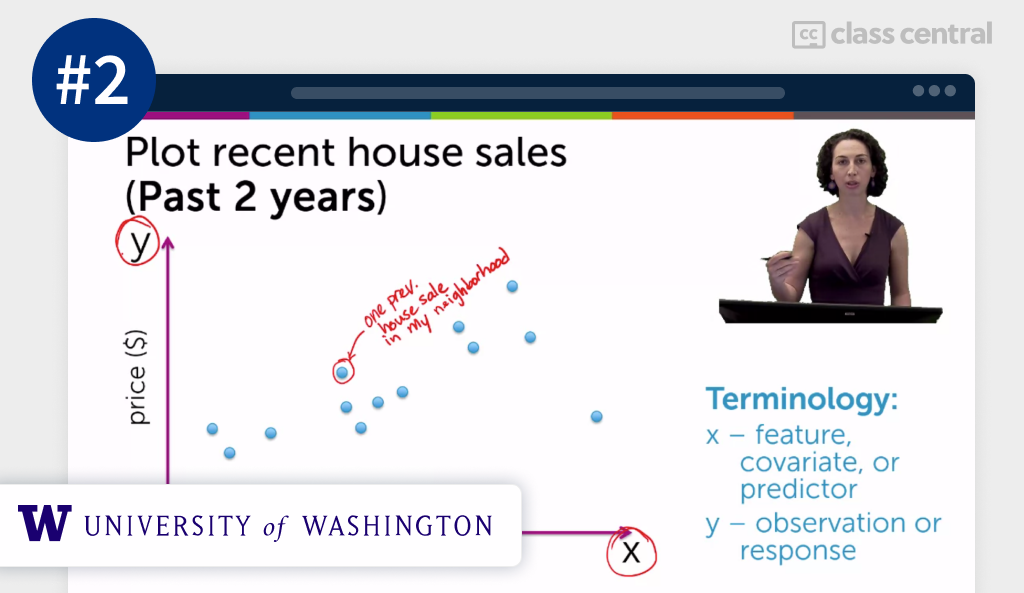 Prof. Emily Fox, co-instructor of the course
Prof. Emily Fox, co-instructor of the course
My second pick for the best machine learning online course is Machine Learning Foundations: A Case Study Approach, offered by the University of Washington on Coursera.
Many academic machine learning courses like to approach the subject from a rather abstract perspective. They spend a lot of time laying down mathematical foundations and relegating more tangible aspects of the discipline to examples and exercises. This course flips that script on its head.
As its name indicates, the course approaches machine learning through case studies, each with a well-defined context and objective. These case studies help ground machine learning concepts in reality.
Instead of learning how to do regressions just because, you’ll learn how to predict house prices with regressions. That doesn’t mean that the course glosses over the theoretical details. It just approaches the subject more pragmatically.
What You'll Learn
The course starts by contextualizing machine learning: explaining what machine learning is, going over some of its applications, and making a case for its importance in the future.
The course introduction also takes the time to cover Python fundamentals as well as the rudiments of tools like Jupyter Notebooks.
The course then moves from case study to case study, using each one to illustrate a particular facet of machine learning: you use regressions to predict house prices, you use classification to evaluate sentiments in user reviews, you use clustering for grouping related articles, you use deep learning to identify objects in images, and so on.
If you’re someone that likes to learn through examples, the clear mapping between tasks and concepts in this course might help make the subject more palatable to you.
By the end of this course, you’ll understand fundamental machine learning tasks like regression, classification, and clustering, and you’ll know when to use each technique.
You’ll know how to extract features from data and use this as inputs for your models. You’ll be able to evaluate your model's correctness using well-defined error metrics. And you’ll be able to implement machine learning applications end-to-end in Python.
How You’ll Learn
This course is broken down into 6 weeks. Each week involves about 3 hours of work. The course is taught through a mix of short videos and readings.
Regarding assessments, most weeks include two exercises that should take about an hour to complete.
One Thing to Note
When the course was released, it used GraphLab, an open-source machine learning tool started by Prof. Carlos Guestrin, one of the course co-instructors. Since then, GraphLab has become Turi, and the course now uses TuriCreate for the exercises.
The videos, however, still use GraphLab, and while both tools are similar, this has caused friction for some learners. So if you take the course, be prepared to do some Googling.
| Institution | University of Washington |
| Provider | Coursera |
| Instructors | Emily Fox, Carlos Guestrin |
| Level | Mixed |
| Workload | 18 hours total |
| Enrollments | 351K |
| Rating | 4.6 / 5.0 (12K) |
| Certificate | Paid |
Fun Facts
- This course is the first of the four-part Machine Learning Specialization on Coursera.
- Emily Fox, who released the course while a Professor at the University of Washington, has since joined the Department of Statistics of Stanford University.
- Turi, the company behind the software you'll use in this course, that was started by the course co-instructor, Carlos Guestrin, was acquired by Apple in 2016 for $200M.
If you're interested in this course, you can find more information about the course and how to enroll here.
3. Machine Learning for All (University of London)
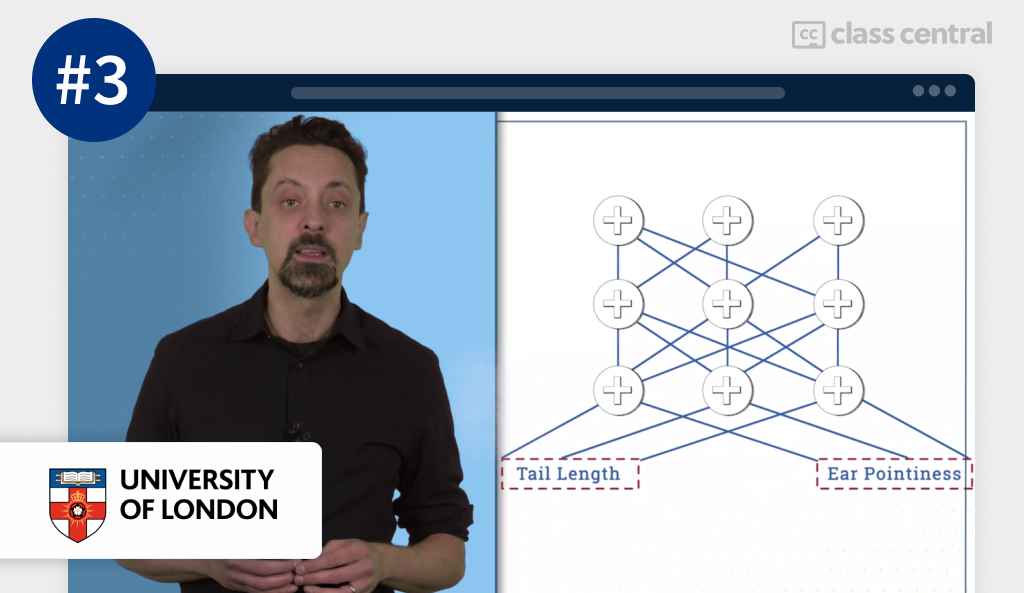 Prof. Marco Gillies, instructor of the course
Prof. Marco Gillies, instructor of the course
My third pick for the best machine learning online course is Machine Learning for All, offered by the University of London on Coursera.
While most other courses either assume prior programming knowledge or teach you programming basics, this course aims to make machine learning accessible to a wider audience. It doesn't require advanced mathematical knowledge or the use of programming languages or machine learning libraries like Python and TensorFlow.
What You’ll Learn
This course starts by explaining what artificial intelligence and machine learning are and how these disciplines are connected.
It discusses various real-world applications of machine learning, including AlphaGo, a machine learning program capable of beating the best Go players in the world. It explains data representation, how to set up a machine learning project, and some of the opportunities and ethical considerations of machine learning.
Finally, the course invites you to implement a machine learning project by collecting data, training a model, and putting it to the test.
By the end of the course, you’ll be equipped with a broad understanding of machine learning, its various uses, and its significance for the future.
You’ll be be familiar with the most important technical concepts that underpin machine learning. You’ll have a high-level grasp of the process of building a machine learning model, from data collection to model evaluation.
And you’ll be prepared to tackle more advanced, theoretical courses on machine learning.
How You’ll Learn
The course is broken down into 4 weeks. Each week involves about 6 hours of work. The course is taught through a mix of video lectures and readings.
Regarding assessments, in most weeks, you’ll complete an hour-long autograded quiz, and in some weeks, you’ll also complete additional practical exercises.
| Institution | University of London |
| Provider | Coursera |
| Instructor | Marco Gillies |
| Level | Beginner |
| Workload | 22 hours total |
| Enrollments | 107K |
| Rating | 4.7 / 5.0 (2.7K) |
| Certificate | Paid |
Fun Facts
- Dr. Marco Gillies, the course instructor, is also a teacher in the University of London’s online bachelor’s degree in computer science, offered on Coursera.
- This course is the most approachable academic course in the ranking: it’s a bona fide university course, but it's tuned to be suitable to a broad audience.
If you're interested in this course, you can find more information about the course and how to enroll here.
4. Machine Learning with Python (IBM)
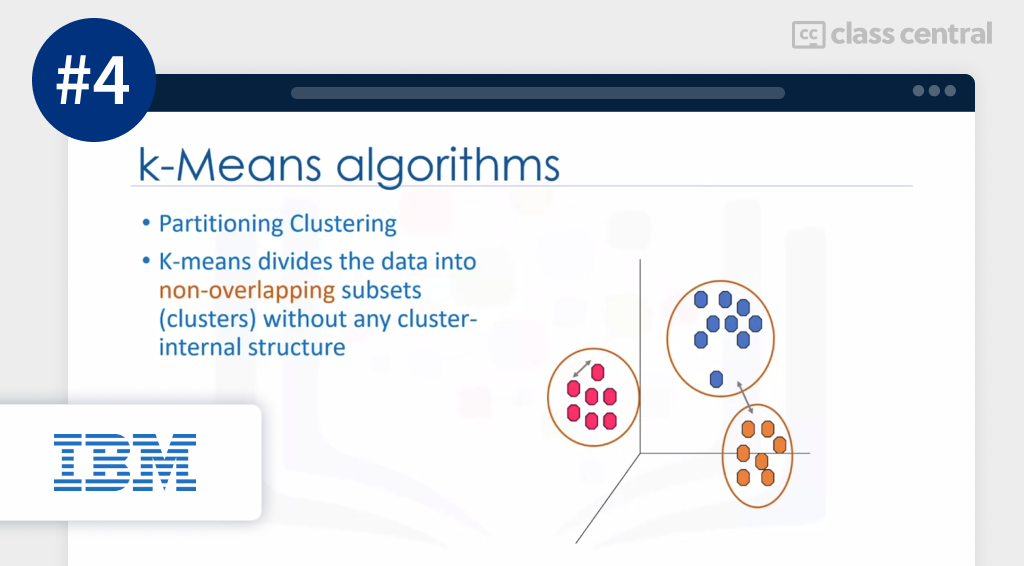 Explaining k-means clustering
Explaining k-means clustering
This course offered by IBM on Coursera teaches machine learning through a hands-on approach using Python, which is nowadays the de facto programming language of artificial intelligence.
Beware, this course will throw math at you. If your calculus is rusty, you might want to brush up on that before taking this course.
What You’ll Learn
The course starts by covering machine learning fundamentals and applications in fields such as healthcare, banking, and telecommunications. And it explains the difference between supervised and unsupervised learning, and goes over which type of learning is suitable for which type of task.
Each week is dedicated to one of the broad machine learning tasks — regression, clustering, and classification — and the various methods that can be used to implement them, such as decision trees, support vector machines, and k-means.
By the end of the course, you’ll have covered a lot of ground in terms of the mathematical underpinnings of machine learning. You’ll be familiar with a large number of applications of machine learning in fields ranging from healthcare to high-performance computing.
You’ll be able to implement a tapestry of machine learning algorithms using Python. And you’ll have practiced using machine learning libraries such as scikit-learn and SciPy.
How You’ll Learn
This course is broken down into 4 weeks. Each week involves about 4 hours of work. The course is taught largely through video lessons.
Regarding assessments, each week culminates in a 10-minute practice exercise.
| Company | IBM |
| Provider | Coursera |
| Instructors | Saeed Aghabozorgi, Joseph Santarcangelo |
| Level | Intermediate |
| Workload | 22 hours total |
| Enrollments | 244K |
| Rating | 4.7 / 5.0 (12K) |
| Certificate | Paid |
Fun Facts
- Saeed Aghabozorgi, one of the course co-instructors is a prolific researcher with over 3300 citations on Google Scholar.
- Besides this course, IBM offers a full-fledged Machine Learning Professional Certificate on Coursera which includes six courses.
If you're interested in this course, you can find more information on the course and how to enroll here.
5. Machine Learning (Georgia Tech)
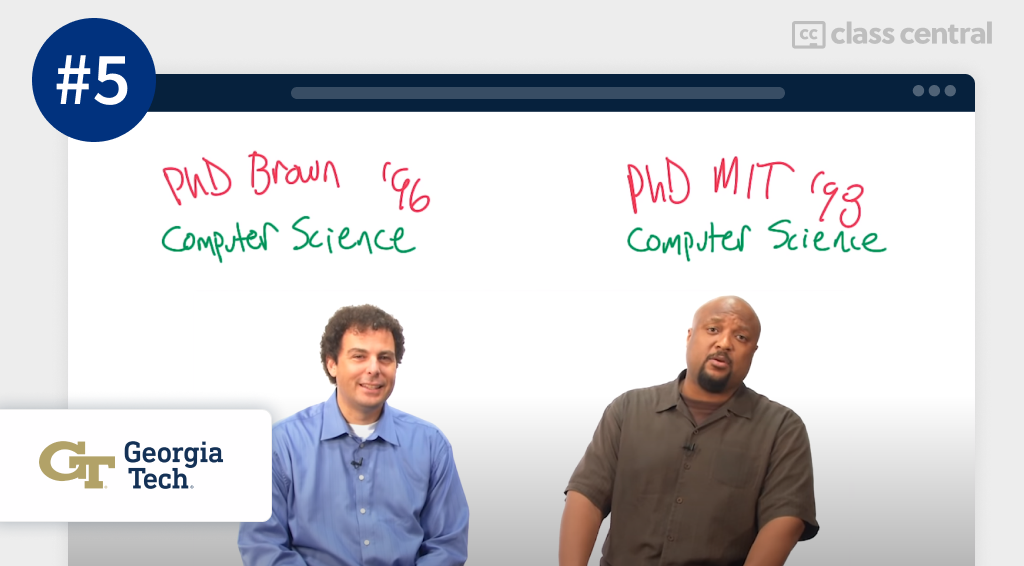 Prof. Michael Littman and Prof. Charles Isbell, co-instructors of the course
Prof. Michael Littman and Prof. Charles Isbell, co-instructors of the course
This course is offered by the Georgia Institute of Technology on Udacity, and it’s also offered as part of Georgia Tech’s Online Master of Computer Science (OMSCS).
This course covers machine learning broadly, emphasizing breadth over depth. It favors a high-level approach of machine learning concepts rather than delving into the nitty gritty details of how to implement specific machine learning algorithms.
I’d argue that this course's main strength is its instructional approach.
The course is taught by two instructors, and the lessons are presented as a conversation between them, with one of the instructors playing the role of the student and raising questions.
The exchange is full of humor, which isn’t something that can be said of many machine learning courses.
What You’ll Learn
This course is divided into three broad machine learning tasks.
First, it covers supervised learning, discussing decision trees, regression and classification, and neural networks. Then, it covers unsupervised learning, discussing clustering, feature selection, and randomized optimization. Finally, it covers reinforcement learning, discussing markov decision processes, game theory, and decision making.
By the end of the course, you’ll have a comprehensive understanding of supervised, unsupervised, and reinforcement learning, and the differences between them.
You’ll learn methods tailored to each of these problems. And you’ll be able to implement methods to solve them, interpret the results of these methods, and evaluate their correctness.
How You’ll Learn
The course is broken down into 21 lessons, and each lesson is made up of short videos with in-video quizzes.
The course doesn’t include publicly available projects. Those can only be accessible by students taking the for-credit version of the course via Georgia Tech.
| Institution | Georgia Institute of Technology |
| Provider | Udacity |
| Instructors | Charles Isbell, Michael Littman |
| Level | Intermediate |
| Workload | 40 hours total |
| Certificate | No |
Fun Facts
- Charles Isbell and Michael Littman, the course instructors, recorded a machine learning version of Michael Jackson’s Thriller. It's very catchy.
- If you like the conversational approach of this course, these instructors have another similar course on reinforcement learning.
If you're interested in this course, you can find more information about the course and how to enroll here.
6. Machine Learning Crash Course with TensorFlow APIs (Google)
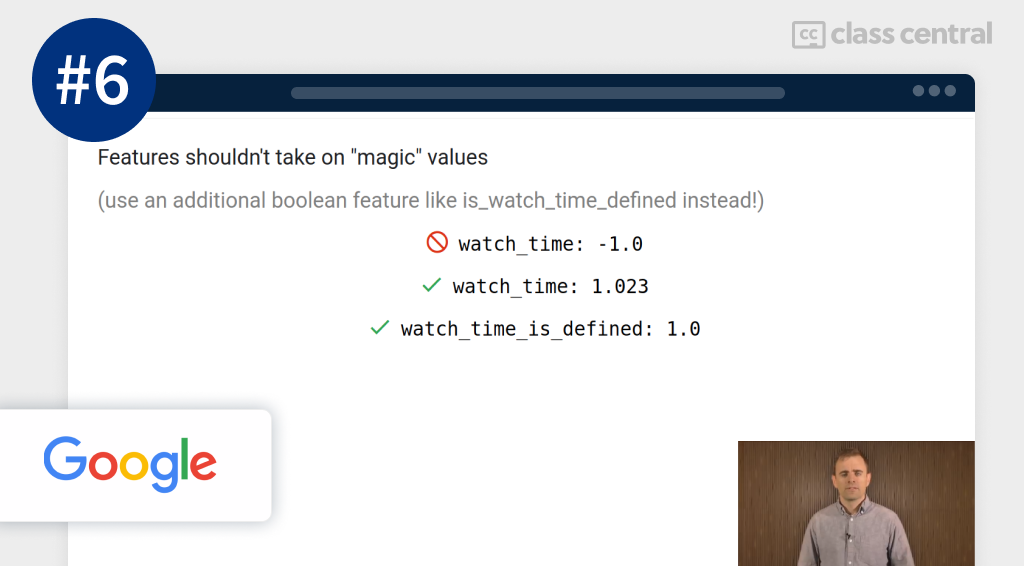 Dr. D. Sculley, co-instructor of the course
Dr. D. Sculley, co-instructor of the course
This course is offered by Google on their developer platform. While most of the courses in this ranking are academic in nature and rather long, this one fits squarely into the category of hands-on introductions to machine learning.
It’s also pragmatic and flexible in that, while it will invite a complete beginner to take the course in full, it will allow those that already have experience in machine learning to instead use the course as a refresher. And that idea is built into the course design, right from the start.
What You’ll Learn
The crash course begins by asking you about your background in machine learning. Depending on your answer, it will orient you toward the appropriate resources, so you can make the best use of your time.
Assuming you’re a complete beginner, you’ll start from square one. So your learning path will cover fundamental machine learning concepts, including regressions, loss functions, and gradient descent.
The course uses TensorFlow, Google’s popular machine learning library. So rapidly the low-level details will be abstracted away by leveraging the library functions.
Some learners could see this as a negative, since you can get away with not understanding how it all works under the hood. But if you're interested in quickly applying machine learning, this crash course should be right up your alley.
A thing to note is that the course also introduces neural networks, a topic many other short machine learning courses prefer to skip or barely touch, since it's a topic worthy of its own separate course.
Google’s crash course, however, is condensed enough to comfortably fit neural nets. But remember, it abstracts away lots of details, so if what you’re after is deep comprehension, you might be better served by another course.
How You’ll Learn
The crash course is broken down into three large sections: (1) machine learning concepts, (2) machine learning engineering, and (3) machine learning systems in the real world.
Each section consists of video lectures presented by Google researchers, readings, and quizzes for self-assessment.
| Provider | |
| Instructors | D. Scully, Cassandra Xia |
| Level | Beginner |
| Workload | 15 hours total |
| Certificate | No |
Fun Facts
- The crash course has a series of follow-up mini-courses covering topics such as how to frame machine learning problems and how to debug machine learning pipelines.
- D. Scully, the course instructor, is Director of Engineering at Google Brain, which coincidentally was cofounded by Andrew Ng, the instructor of this ranking's top pick.
If you're interested in this course, you can find more information about the course and how to enroll here.
7. Machine Learning A-Z: Hands-On Python & R in Data Science
 Kirill Eremenko, co-instructor of the course
Kirill Eremenko, co-instructor of the course
True to its name, this Udemy course is a comprehensive but practical introduction to machine learning. It slowly works its way up from data preprocessing to model validation, but glosses over some of the underlying math.
If you want to jump straight into “doing”, this course might be a good fit.
What You’ll Learn
The course starts by covering various types of regression, classification, and clustering models. It discusses reinforcement learning as well as natural language processing, and it covers the fundamentals of artificial neural networks.
The course uses the Python and R programming languages, and the TensorFlow machine learning library.
How You’ll Learn
The course includes over 40 hours of video lessons, interspersed with practical exercises. You’ll build an intuition for each concept and method before applying them to solve concrete problems using dedicated machine learning libraries.
| Provider | Udemy |
| Instructors | Kirill Eremenko, Hadelin de Ponteves |
| Level | Mixed |
| Workload | 44 hours total |
| Enrollments | 843K |
| Rating | 4.5 / 5.0 (154K) |
| Certificate | Paid |
Fun Facts
- With over 800K registered learners, Machine Learning A-Z is the most popular machine learning courses on Udemy, and one of the most successful courses on the entire platform.
- Between them, the instructors Kirill Eremenko and Hadelin de Ponteves have created over 80 courses and have close to 3.5M students.
If you're interested in this course, you can find more information about the course and how to enroll here.
8. Introduction to Machine Learning in Production (DeepLearning.AI)
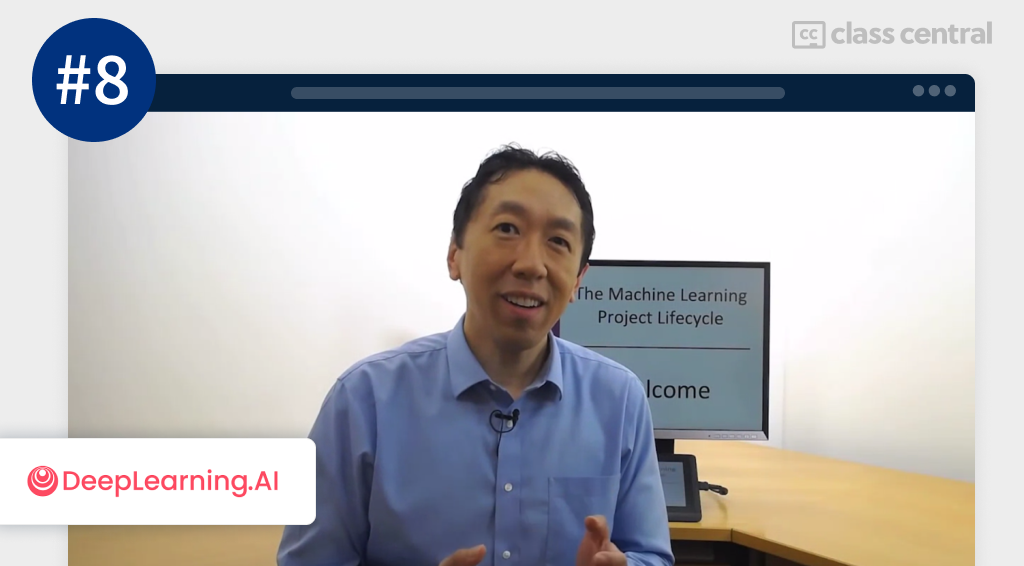 Prof. Andrew Ng, co-instructor of the course
Prof. Andrew Ng, co-instructor of the course
After launching the machine learning course that tops this ranking and co-founding Coursera, Andrew Ng went on to create another company, DeepLearning.AI.
The company offers a wide variety of courses on machine learning and artificial intelligence, including this course, which covers how to use machine learning in a production environment.
Unlike previous courses, which mainly targeted a general audience (albeit not alway beginners), this course is geared toward learners who already have a solid understanding of machine learning. It targets students who would like to be able to confidently implement end-to-end machine learning pipelines in a professional setting.
What You’ll Learn
This course starts by discussing the lifecycle of a machine learning project and how to deploy production-ready machine learning systems.
Then, the course explains strategies to pick adequate models and train them, as well as some of the pitfalls to avoid when dealing with skewed data sets.
Finally, the course covers how to handle classification problems and how to establish a baseline to assess your model's performance.
How You’ll Learn
This course is broken down into three weeks. Each week involves about 3 hours of work. But remember, it’s an advanced course, so it assumes you already have a machine learning background. Otherwise, the workload could be much higher.
And much like Andrew Ng’s other courses, the course consists of video lessons and readings. Each week ends with several practical exercises using Python and specialized frameworks and libraries like PyTorch and Keras.
| Company | DeepLearning.AI |
| Provider | Coursera |
| Instructor | Andrew Ng |
| Level | Mixed |
| Workload | 10 hours total |
| Enrollments | 38K |
| Rating | 4.8 / 5.0 (1.1K) |
| Certificate | Paid |
Fun Facts
- This course is the first of a four-course Coursera Specialization dedicated to MLOps, machine learning engineering for production.
- DeepLearning.AI offers many courses on Coursera, ranging from AI fundamentals to specialized deep learning topics such as generative adversarial networks.
If you're interested in this course, you can find more information about the course and how to enroll here.
9. Python for Data Science and Machine Learning Bootcamp
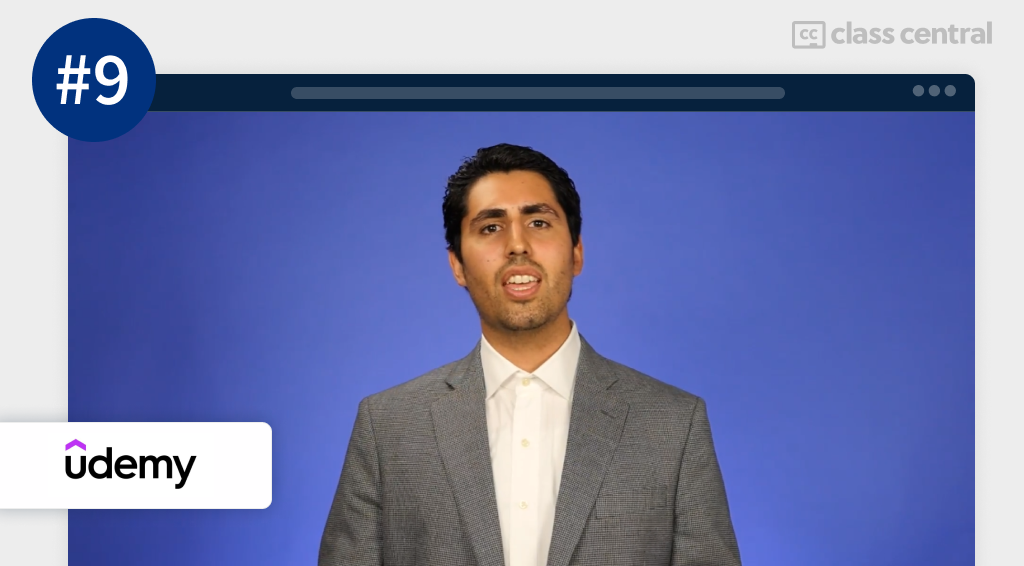 Jose Portilla, instructor of the course
Jose Portilla, instructor of the course
As the de facto language of machine learning and AI (at least for now), Python is often a prerequisite of machine learning courses.
Some courses start with a Python refresher before jumping into actual machine learning. But if you’re a novice programmer, a simple refresher may not cut it.
So you either find a Python course and take that first, or you find a course that teaches both machine learning and Python. This is that course.
What You’ll Learn
In the first part of the course, after setting up your development environment, you’ll jump into a Python crash course. You'll learn the fundamentals of the programming language as well as a plethora of widely used libraries, such as NumPy, Pandas, and Matplotlib.
Once you've integrated these skills, you’ll be equipped to tackle the second part of the course, which is entirely dedicated to machine learning.
As usual, you’ll start with regression and work your way up from there, exploring machine learning models and systems ranging from k-means clustering to artificial neural networks.
How You’ll Learn
This course includes over 25 hours of video lessons interspersed with practical exercises. In addition, the course includes numerous references to external material, for those that want to go above and beyond.
| Provider | Udemy |
| Instructor | Jose Portilla |
| Level | Mixed |
| Workload | 25 hours total |
| Enrollments | 509K |
| Rating | 4.7 / 5.0 (109K) |
| Certificate | Paid |
Fun Facts
- With over 2.6M students on Udemy, the course instructor Jose Portilla is one of Udemy’s most popular instructors.
- While the course covers both Python and Machine learning, if you want to dive deeper into either subjects, Jose Portilla also teaches courses exclusively dedicated to Python and exclusively dedicated to machine learning.
If you're interested in this course, you can find more information about the course and how to enroll here.
10. Machine Learning for Musicians and Artists (Goldsmith)
 Dr. Rebecca Fiebrink, instructor of the course
Dr. Rebecca Fiebrink, instructor of the course
Finally, to end this ranking on a high note, my tenth pick is Machine learning for Musicians and Artists, offered by Goldsmith, University of London, through Kadenze.
This course is a bit unconventional: it approaches machine learning it from an artistic angle, from music to visual arts. If that’s actually the sort of mix you’re looking for, then consider this our one and only first pick.
What You’ll Learn
In this course, you’ll learn the fundamentals of machine learning, but you’ll do so by connecting the topic to art, motion, and sound. More specifically, you’ll learn how to use machine learning to interpret human movement, music, and other sources of real-time data.
Don’t worry, this course will also entail learning more pedestrian but essential machine learning concepts, such as regression, classification, and segmentation. It also tackles practical concepts, such as how to configure an end-to-end machine learning pipeline.
How You’ll Learn
The course is broken down into 7 sessions. Each session involves about 8 hours of work.
If you audit the course, you’ll have access to the course material for free, but not the assignments. If you subscribe, you’ll then have access to the assignments and a certificate at the end.
This course uses peer-feedback assignments, meaning your copy will be graded by other students and, in turn, you’ll grade other students to get your grade back.
| Institution | Goldsmith, University of London |
| Provider | Kadenze |
| Instructor | Rebecca Fiebrink |
| Level | Beginner |
| Workload | 50 hours total |
| Certificate | Paid |
Fun Facts
- This course has an 4.8 / 5.0 rating on Class Central with 80+ ratings, making it one of the highest-rated machine courses on the platform.
- It’s a course that mixes machine learning and art… need I say more!?
If you're interested in this course, you can find more information about the course and how to enroll here.

